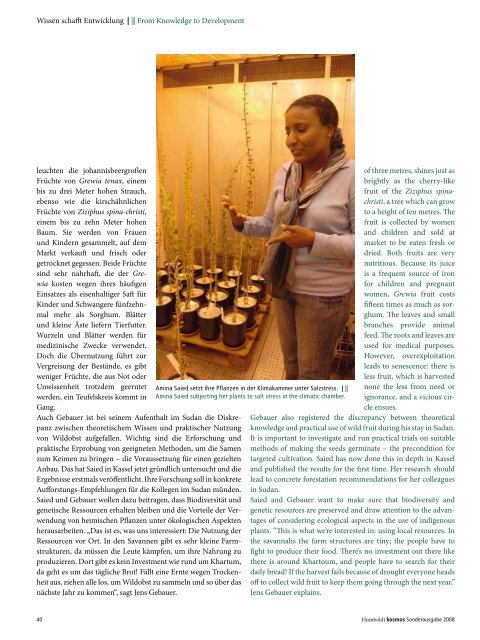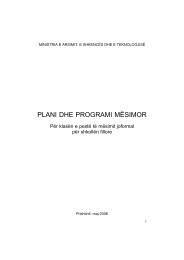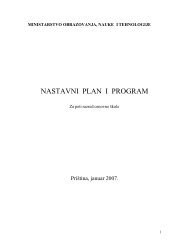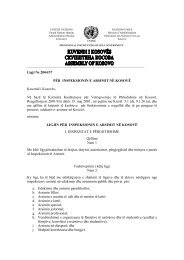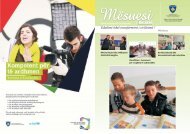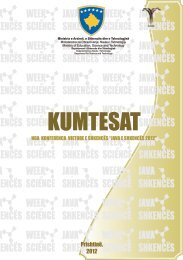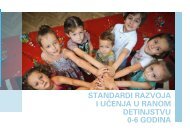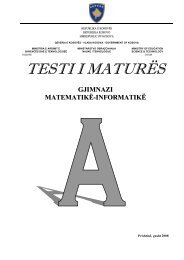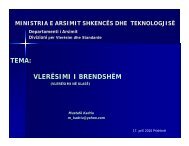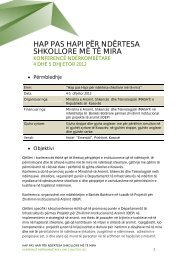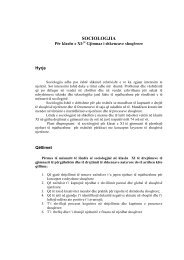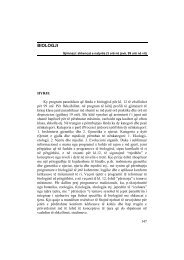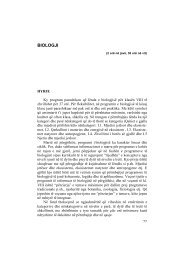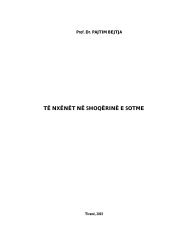Humboldt Kosmos 90/2007: Wissen schafft Entwicklung
Humboldt Kosmos 90/2007: Wissen schafft Entwicklung
Humboldt Kosmos 90/2007: Wissen schafft Entwicklung
Erfolgreiche ePaper selbst erstellen
Machen Sie aus Ihren PDF Publikationen ein blätterbares Flipbook mit unserer einzigartigen Google optimierten e-Paper Software.
<strong>Wissen</strong> <strong>schafft</strong> <strong>Entwicklung</strong> | || From Knowledge to Development <strong>Wissen</strong> <strong>schafft</strong> <strong>Entwicklung</strong> | || From Knowledge to Development<br />
leuchten die johannisbeergroßen<br />
Früchte von Grewia tenax, einem<br />
bis zu drei Meter hohen Strauch,<br />
ebenso wie die kirschähnlichen<br />
Früchte von Ziziphus spina-christi,<br />
einem bis zu zehn Meter hohen<br />
Baum. Sie werden von Frauen<br />
und Kindern gesammelt, auf dem<br />
Markt verkauft und frisch oder<br />
getrocknet gegessen. Beide Früchte<br />
sind sehr nahrhaft, die der Grewia<br />
kosten wegen ihres häufigen<br />
Einsatzes als eisenhaltiger Saft für<br />
Kinder und Schwangere fünfzehnmal<br />
mehr als Sorghum. Blätter<br />
und kleine Äste liefern Tierfutter.<br />
Wurzeln und Blätter werden für<br />
medizinische Zwecke verwendet.<br />
Doch die Übernutzung führt zur<br />
Vergreisung der Bestände, es gibt<br />
weniger Früchte, die aus Not oder<br />
Unwissenheit trotzdem geerntet<br />
werden, ein Teufelskreis kommt in<br />
Gang.<br />
Auch Gebauer ist bei seinem Aufenthalt im Sudan die Diskrepanz<br />
zwischen theoretischem <strong>Wissen</strong> und praktischer Nutzung<br />
von Wildobst aufgefallen. Wichtig sind die Erforschung und<br />
praktische Erprobung von geeigneten Methoden, um die Samen<br />
zum Keimen zu bringen – die Voraussetzung für einen gezielten<br />
Anbau. Das hat Saied in Kassel jetzt gründlich untersucht und die<br />
Ergebnisse erstmals veröffentlicht. Ihre Forschung soll in konkrete<br />
Aufforstungs-Empfehlungen für die Kollegen im Sudan münden.<br />
Saied und Gebauer wollen dazu beitragen, dass Biodiversität und<br />
genetische Ressourcen erhalten bleiben und die Vorteile der Verwendung<br />
von heimischen Pflanzen unter ökologischen Aspekten<br />
herausarbeiten. „Das ist es, was uns interessiert: Die Nutzung der<br />
Ressourcen vor Ort. In den Savannen gibt es sehr kleine Farmstrukturen,<br />
da müssen die Leute kämpfen, um ihre Nahrung zu<br />
produzieren. Dort gibt es kein Investment wie rund um Khartum,<br />
da geht es um das tägliche Brot! Fällt eine Ernte wegen Trockenheit<br />
aus, ziehen alle los, um Wildobst zu sammeln und so über das<br />
nächste Jahr zu kommen“, sagt Jens Gebauer.<br />
of three metres, shines just as<br />
brightly as the cherry-like<br />
fruit of the Ziziphus spinachristi,<br />
a tree which can grow<br />
to a height of ten metres. The<br />
fruit is collected by women<br />
and children and sold at<br />
mar ket to be eaten fresh or<br />
dried. Both fruits are very<br />
nutritious. Because its juice<br />
is a frequent source of iron<br />
for children and pregnant<br />
women, Grewia fruit costs<br />
fifteen times as much as sorghum.<br />
The leaves and small<br />
branches provide animal<br />
feed. The roots and leaves are<br />
used for medical purposes.<br />
However, overexploitation<br />
leads to senescence: there is<br />
less fruit, which is harvested<br />
none the less from need or<br />
ignorance, and a vicious circle<br />
ensues.<br />
Gebauer also registered the discrepancy between theoretical<br />
knowledge and practical use of wild fruit during his stay in Sudan.<br />
It is important to investigate and run practical trials on suitable<br />
methods of making the seeds germinate – the precondition for<br />
targeted cultivation. Saied has now done this in depth in Kassel<br />
and published the results for the first time. Her research should<br />
lead to concrete forestation recommendations for her colleagues<br />
in Sudan.<br />
Saied and Gebauer want to make sure that biodiversity and<br />
genetic resources are preserved and draw attention to the advantages<br />
of considering ecological aspects in the use of indigenous<br />
plants. “This is what we’re interested in: using local resources. In<br />
the savannahs the farm structures are tiny; the people have to<br />
fight to produce their food. There’s no investment out there like<br />
there is around Khartoum, and people have to search for their<br />
daily bread! If the harvest fails because of drought everyone heads<br />
off to collect wild fruit to keep them going through the next year,”<br />
Jens Gebauer explains.<br />
Amina Saied setzt ihre Pflanzen in der Klimakammer unter Salzstress. | ||<br />
Amina Saied subjecting her plants to salt stress in the climatic chamber.<br />
Das <strong>Humboldt</strong>-Netzwerk trägt Früchte<br />
Im Jahr 2006 initiierte Jens Gebauer zusammen mit dem Fachgebietsleiter<br />
Andreas Bürkert eine Institutspartnerschaft zwischen<br />
seinem Heimatinstitut und der ARC. Gebauers Ex-Gastgeber El-<br />
Siddig managt das Projekt im Sudan, das der Verbesserung der<br />
urbanen Landwirtschaft in Khartum dienen soll. Im Frühjahr<br />
<strong>2007</strong> haben Gebauer und ein Kasseler Kollege dort einen Kurs für<br />
Studenten von der ARC und – über die Vermittlung von Amina<br />
Saied – der Universität Khartum abgehalten. Die Zusammenarbeit<br />
und der Austausch im Netzwerk eröffnen Perspektiven für<br />
sudanesische wie deutsche Studenten und sind ein Gewinn für<br />
alle: Die Qualität der individuellen Forschung werde durch die<br />
Interdisziplinarität, durch die Einbindung verschiedener Sichtweisen,<br />
Ideen und Erfahrungen deutlich verbessert, meint Saied.<br />
Auch außerhalb der reinen Forschung profitieren die <strong>Humboldt</strong>ianer.<br />
Amina Saied konnte beispielsweise an einem International<br />
Deans’ Course teilnehmen, der Dekane aus Afrika für das Hochschulmanagement<br />
qualifizieren will. Das habe ihr sehr geholfen,<br />
sagt Saied, denn als sie aus Deutschland zurückkam, habe sie<br />
2005 die Leitung ihres Instituts quasi unvorbereitet übernehmen<br />
müssen.<br />
Damit das <strong>Humboldt</strong>-Netzwerk auch in Deutschland weiter<br />
wächst und gedeiht, war Jens Gebauer in diesem Jahr an der<br />
Gründung der Deutschen Gesellschaft der <strong>Humboldt</strong>ianer e.V. in<br />
Kassel beteiligt. Nun hat Gebauer zunächst mal seine Habilitation<br />
eingereicht, aber was ein echter Feldforscher ist, den zieht es<br />
wieder hinaus in die Welt: Für den Sommer 2008 ist ein weiterer<br />
Aufenthalt beim Partnerinstitut geplant. Neben der Inventarliste<br />
seines Büros hängt griffbereit der Sonnenhut am Regal. n<br />
Von Kristina Güroff<br />
Dr. Amina Sirag Saied Dr. Jens Gebauer<br />
the <strong>Humboldt</strong> Network bears fruit<br />
In 2006, Jens Gebauer and his head of department, Andreas<br />
Bürkert, started up an institutional partnership between their<br />
own institute and the ARC. In Sudan, Gebauer’s former host, El-<br />
Siddig, manages the project which aims to improve urban agriculture<br />
in Khartoum. In spring <strong>2007</strong>, Gebauer and a colleague from<br />
Kassel ran a course there for students from ARC and – facilitated<br />
by Amina Saied – from Khartoum University. Cooperation and<br />
exchange within the network open up perspectives for both Sudanese<br />
and German students and benefit everyone: the quality of<br />
individual research is significantly improved by interdisciplinarity<br />
and by drawing on different points of view, ideas and experience,<br />
Saied believes.<br />
The benefits for the <strong>Humboldt</strong>ians go beyond pure research.<br />
Amina Saied was able to take part in an International Deans’<br />
Course, for example, providing qualifications in university management<br />
for deans from Africa. This was extremely useful, Saied<br />
claims, because after she had returned from Germany in 2005,<br />
she had had to take on the leadership of her institute more or less<br />
unprepared.<br />
To make sure the <strong>Humboldt</strong> Network continues to blossom and<br />
grow, Jens Gebauer was involved in founding the German Association<br />
of <strong>Humboldt</strong>ians in Kassel this year. Now he has just submitted<br />
his thesis for a Habilitation, but like all true field researchers,<br />
he cannot resist the call to go out into the world: in summer 2008,<br />
he is planning the next stay at the partner institute. Hanging on<br />
the shelves next to the inventory list for his office is his sun hat –<br />
ready for action. n By Kristina Güroff<br />
Dr. Amina Sirag Saied leitet das<br />
institut für Gartenbau an der<br />
universität khartum im Sudan.<br />
Seit Januar <strong>2007</strong> forscht sie als<br />
Georg Forster-Stipendiatin an der<br />
universität kassel bei Professor<br />
Dr. Andreas Bürkert und Dr. Jens<br />
Gebauer. Jens Gebauer arbeitete<br />
von 2003 bis 2005 als Feodor<br />
lynen-Stipendiat im Sudan.<br />
Dr. Amina Sirag Saied is head of<br />
the Department of Horticulture at<br />
khartoum university in Sudan. She<br />
has been a Georg Forster Fellow<br />
since January <strong>2007</strong>, researching at<br />
kassel university together with<br />
Professor Dr. Andreas Bürkert and<br />
Dr. Jens Gebauer. From 2003 to<br />
2005, Jens Gebauer was a Feodor<br />
lynen Fellow in Sudan.<br />
40 <strong>Humboldt</strong> kosmos Sonderausgabe 2008<br />
41


